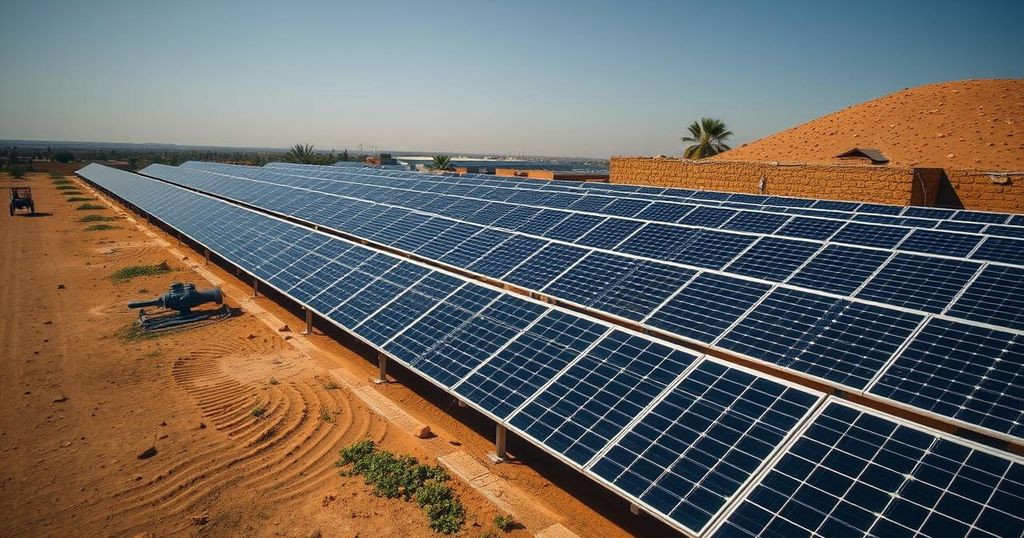Egypt Expands Energy Cooperation with Djibouti Through Solar Project
Egypt has initiated a solar power project in Djibouti, aimed at enhancing energy independence and reducing reliance on Ethiopia. The project involves constructing a solar farm and training local technicians, reflecting Egypt’s strategic regional objectives and cooperation with Djibouti amidst ongoing tensions with Ethiopia over Nile water rights. This development is anticipated to influence the broader geopolitical landscape of the Horn of Africa.
Egypt has strengthened its relationship with Djibouti by embarking on a significant solar energy project aimed at reducing Djibouti’s dependence on Ethiopia. Under this initiative, a solar power farm will be constructed in Djibouti’s desert regions, with an initial capacity of 276.5 kilowatts, and plans for future expansion to 300 kilowatts. The Egyptian government will not only finance this project but also provide training for Djiboutian technicians to ensure effective operation. The agreement was signed electronically by Egypt’s Energy Minister, Mahmoud Essmat, and Djibouti’s Energy Minister, Yonis Ali Gued, who focused on their mutual economic goals, deliberately omitting the political ramifications of their collaboration. This agreement includes the installation of solar panels near Omar Jaggaa, a step that aligns with President Ismail Omar Guelleh’s vision of prioritizing energy as a driver for economic and social development in Djibouti. Observers noted that while both nations discussed economic cooperation, the potential implications of this partnership on the broader Horn of Africa geopolitical landscape, particularly in regard to ongoing tensions between Egypt and Ethiopia over Nile water rights, remain significant. Djibouti has historically had robust trade relations with Ethiopia, which relies heavily on its southern neighbor for key imports through the Port of Djibouti, while Djibouti has depended on Ethiopia for over sixty percent of its electricity supply. In light of these dynamics, the recent partnership with Egypt could alter the longstanding cooperative energy ties between Djibouti and Ethiopia. Despite Djibouti’s invitation for Ethiopia to establish a new port, the latter’s interests lean towards maintaining its own territorial access through Somaliland. The African Development Bank has facilitated a new 283-kilometer power transmission line from Dire Dawa, Ethiopia, to Djibouti, emphasizing the region’s intricate energy dependencies. Djibouti’s electricity consumption has been steadily increasing, with projections estimating a daily demand of approximately one gigawatt by 2030. Collaborative projects focusing on renewable energy sources like solar power reflect Djibouti’s strategic shift towards sustainable solutions to meet its growing energy needs. Currently, about 65 percent of Djibouti’s population has access to electricity, a figure expected to rise to 72 percent once the new power transmission line is fully operational, and further enhancements will come with the initiation of the solar farm.
The geopolitical landscape of the Horn of Africa has been marked by complex relationships, particularly between Egypt, Ethiopia, and Djibouti. The region has seen tensions over water rights, especially concerning the Nile River, which is a critical resource for Egypt. Additionally, Djibouti serves as a vital trade conduit for Ethiopia, facilitating the import of 95 percent of Ethiopian goods and supplying a substantial portion of Djibouti’s electricity. As both countries navigate their political and economic relations, Egypt’s outreach to Djibouti through renewable energy projects like the solar power farm reflects broader strategic moves within the region, potentially reshaping alliances and economic dependencies.
In conclusion, Egypt’s solar power project in Djibouti signifies a pivotal development not only for energy cooperation but also for the shifting alliances in the Horn of Africa. As Egypt seeks to undermine Ethiopia’s influence in the region, the implications of this partnership could lead to increased competition for economic resources and energy security. The project’s aim to boost renewable energy and reduce dependency on Ethiopia aligns with regional developments in energy demands and sustainability efforts, pointing towards a potentially transformative shift in regional dynamics.
Original Source: www.theeastafrican.co.ke








Post Comment